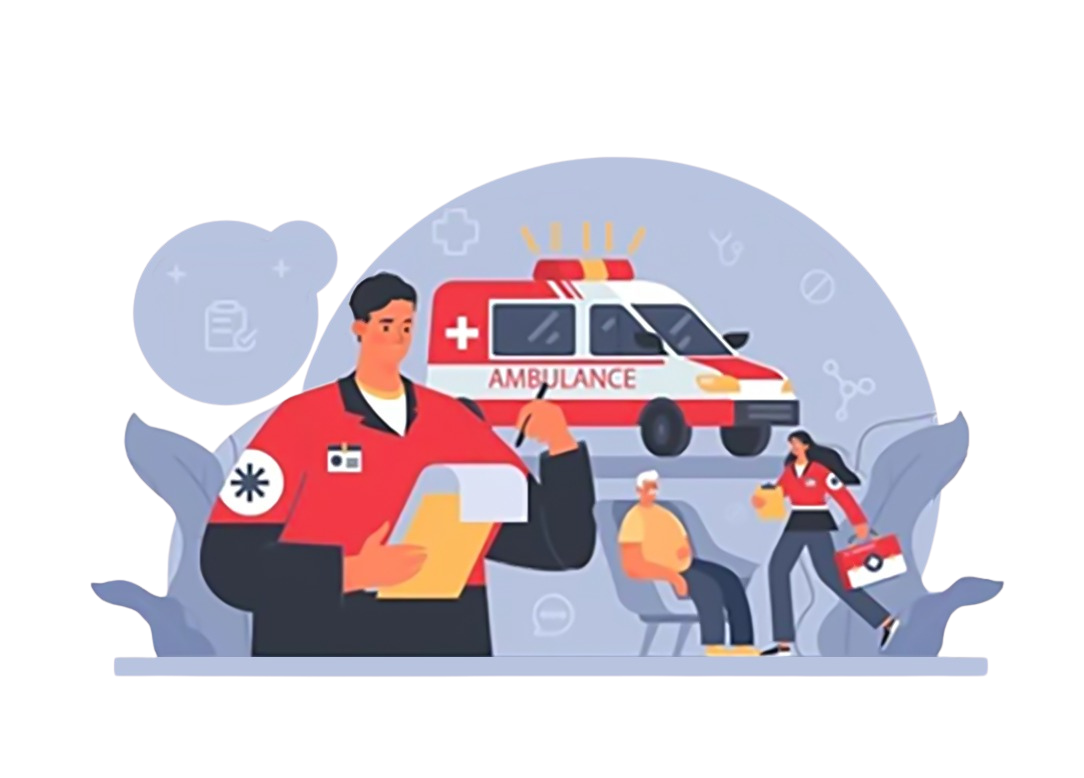This Course Structure is Curated as per the NEP-2020 Guidelines
Course Overview
M.Sc. Emergency Medicine Technology program at Malla Reddy Vishwavidyapeeth, Hyderabad, is a postgraduate course designed to provide advanced training in managing medical emergencies, trauma care, and acute patient stabilization.
This program focuses on equipping students with the theoretical knowledge and hands-on skills from 1st semester itself. The curriculum focuses on advanced emergency response protocols, critical care techniques, trauma management, and prehospital care. Students gain hands-on experience in operating advanced life-support systems, managing critically ill patients, and handling emergencies in high-pressure environments.
Graduates of this program emerge as ‘Skilled Senior Emergency Medicine Technologists’, enabling them to pursue further higher studies & do research in Emergency Medicine Technology, along with plenty of job opportunities globally.

Course Details
Description: 2 Years Degree Program
No. of Seats: 20
No. of Credits: 80 minimum & as specified
- Eligibility
- Curriculum Structure
- Program Outcomes
- Career Enhancement
- Higher Studies
- Job Roles & Progression
- The minimum eligibility is a B.Sc. degree in Emergency Medical Technology, Paramedical Sciences, Allied Health Sciencesor equivalent with at least 50% aggregate marks from a recognized university.
Semester | Name of the Subject |
Semester 1 | Principles of Emergency Medicine Advanced Anatomy and Physiology Patient Safety in Emergency Care Pharmacology in Emergency Medicine Practical: Patient Triage and Safety Protocols |
Semester 2 | Trauma and Critical Care Management Advanced Life Support (ALS) Pre-Hospital Care and Transportation Legal Aspects in Emergency Care Practical: Advanced Life Support and Trauma Management |
Semester 3 | Disaster Management and Mass Casualty Care Pediatric and Geriatric Emergency Care Research Methodology and Biostatistics Mental Health Support in Emergencies Practical: Disaster Simulation and Patient Management |
Semester 4 | Emergency Medicine Unit Management Emerging Technologies in Emergency Care Thesis/Research Project Practical: Emergency Unit Operations and Compliance |
- Advanced Patient Assessment and Triage: Proficiency in assessing, prioritizing, and managing patients based on the severity of their condition.
- Advanced Life Support (ALS) and Trauma Care: Skills in providing ALS, trauma management, and critical care to patients in emergencies.
- Disaster Management and Mass Casualty Response: Expertise in handling large-scale emergency situations with multiple casualties.
- Pre-Hospital Care and Transportation: Knowledge of patient stabilization, safe transportation, and pre-hospital emergency care.
- Mental Health Support in Emergencies: Understanding of providing psychological support in crisis situations.
- Emergency Unit Management: Skills in managing emergency care units, coordinating patient flow, and ensuring compliance with safety standards.
- Certification in Advanced Trauma Life Support (ATLS): Specialized training in trauma care for critically injured patients.
- Pre-Hospital Trauma Life Support (PHTLS) Certification: Focuses on emergency care, stabilization, and transportation in pre-hospital settings.
- Disaster and Mass Casualty Management Certification: Covers strategies for managing emergencies with multiple casualties and disaster response.
- Mental Health First Aid in Emergencies Certification: Provides skills in delivering psychological first aid during crisis situations.
- Emergency Unit Management Certification: Focuses on managing emergency unit operations, staff coordination, and patient safety.
- Ph.D. in Emergency Medicine or Trauma Care
- Fellowship in Critical Care or Emergency Trauma
- Postgraduate Diploma in Disaster Management
- Advanced Certifications in Pediatric and Geriatric Emergency Care
Duration | Roles and Responsibilities | Salary Range |
0-3 years | Emergency Medical Technician, Trauma Care Specialist | ₹5,00,000 – ₹8,00,000 per annum |
3-5 years | Senior Emergency Technologist, Critical Care Specialist | ₹8,00,000 – ₹12,00,000 per annum |
5-10 years | Emergency Unit Manager, Disaster Response Coordinator | ₹12,00,000 – ₹15,00,000 per annum |
10+ years | Director of Emergency Services, Chief Emergency Technologist | ₹15,00,000+ per annum |

Fee Structure Per Academic Year
| Tuition Fee | Miscellaneous Fee | Scholarship | ||
| 200000 ₹ | 15000 ₹ | Above 90% – 40000 ₹ | Between 81-90% – 20000 ₹ | Between 71-80% – 10000 ₹ |




